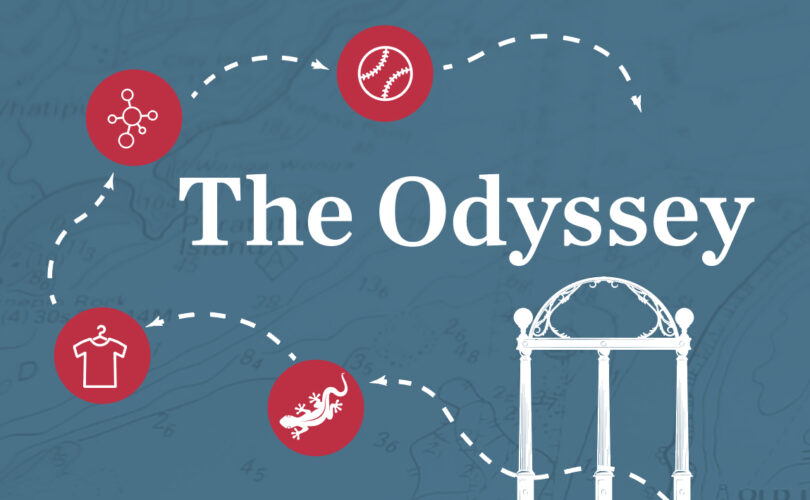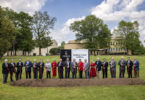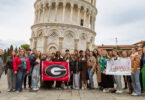A college career is a journey. At UGA, the first step for Bulldog undergraduates is the First-Year Odyssey Seminar Program.
Small classes, focused topics, accessible faculty, experiential learning—all are hallmarks of the program, which was created in 2011 to introduce college-level courses to first-year students in a low-pressure atmosphere and help these new Bulldogs establish lasting relationships with the campus and its people.
“Our goal is to build community, and having a small class with familiar faces and an approachable professor helps foster a sense of belonging,” says program director Marisa Anne Pagnattaro PhD ’98, vice president for instruction and senior vice provost for academic planning.
Each year through First-Year Odyssey, incoming freshmen choose from more than 400 one-credit-hour courses taught by tenure-track faculty members from nearly all of UGA’s 90 academic departments. Most seminars meet for one hour once a week for 15 weeks, a time frame designed to fit easily into first-year students’ busy schedules.
The wide range of seminar offerings makes it easy for students to pursue their own interests or, in many cases, unlock a passion they didn’t even know they had.
Sometimes they even get to know native Georgians like snakes and salamanders on a first-name basis.
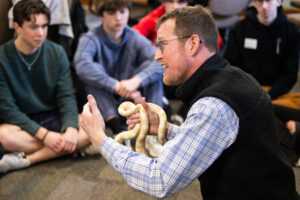
Nick Fuhrman introduces a variety of guests to the students in his First-Year Odyssey seminar. Snowy, an albino corn snake, is the star. Sharon, an eastern box turtle, is also popular and happy to be held. (Photo by Chamberlain Smith/UGA)
Nick Fuhrman
Associate Dean for Outreach and Meigs Professor of Environmental Education
Warnell School of Forestry and Natural Resources
Environmental Education 101: Using Nature to Inspire Action
For his lectures—which are more like conversations, actually—environmental educator Nick Fuhrman organizes his seminar students in a semicircle. Sometimes he’ll even bring in an LED campfire.
On this day, the fake flames stay unlit, but that doesn’t mean there is nothing for the students to look at. Or, more importantly, touch. Today’s special guests are Sharon the eastern box turtle, Sanford the tiger salamander, and Snowy the albino corn snake. All of them are native to Georgia and happy to be held.
Addressing a crowd can be nerve-racking for seasoned professionals. For college students experiencing their first class on campus, that stress can grow exponentially. Fuhrman teaches his First-Year Odyssey students basic public speaking skills—while holding live animals.
“A big part of environmental education is just being in front of people and talking,” says Fuhrman, a gifted communicator who makes regular appearances as “Ranger Nick” on the Georgia Farm Bureau’s television show, The Farm Monitor. His casual, energetic approach is ideal for the First-Year Odyssey atmosphere.
“Animals can lower public speaking anxiety because the audience’s attention isn’t on you; it’s on the animal,” he continues.
All of them are hits, but 19-year-old Snowy is the unquestioned star. Students eagerly, but gently, pass her around. A few students have not touched a snake before, but all understand the importance of respecting the environment and the creatures that inhabit it.
“Ranger Nick is good with using the animals to connect with the audience,” says Lauren Morrison, a first-year student from Canton intending to major in pharmaceutical sciences. “I might go into teaching, and that’s something I could use in the future.”
Because of its popularity, Fuhrman’s seminar is one of the few entries scheduled in both the fall and spring semesters. Most students will not major in environmental sciences, but the skills they learn in Ranger Nick’s classes are transferable and the experiences are meaningful.
Morgan Milbry, an intended exercise and sports science major from McDonough, agrees that working with the animals makes conversations with humans easier. “This has been a nice class to be a part of because it’s helped ease my nerves when talking to other people.”
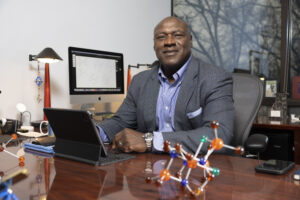
For each session, Gregory Robinson’s students pick a molecule to research and discuss. Through this process, his seminar illustrates one of the First-Year Odyssey Program’s primary goals: to introduce first-year students to the basics of research. (Photo by Peter Frey/UGA)
Gregory Robinson
UGA Foundation Professor of Chemistry
Franklin College of Arts and Sciences
Molecules that Changed History
The students in Gregory Robinson’s freewheeling First-Year Odyssey course come in ready for anything. Every session, each of the dozen attendees picks a molecule, researches it, and then comes to class ready to discuss it.
The seminar illustrates one of the First-Year Odyssey Program’s primary goals: to introduce students to the basics of research.
Each week, five or six molecules are presented, and the exploration of the subject matter careens in all sorts of enlightening directions. For instance, a class discussion of the molecule dichlorodiethyl sulfide led to a deep dive into early 20th-century history.
Dichlorodiethyl sulfide—more commonly known as mustard gas—was used to horrific effect. Robinson also introduced the class to German chemist Fritz Haber, whose work not only contributed to chemical weapons but also to wondrous ammonia-based fertilizers, many of which are still used to help produce crops today. Although Haber received the Nobel Prize for chemistry in 1918 for the synthesis of ammonia (which led to fertilizers), his legacy is permanently tarnished by his role in the development of chemical weapons.
“In most conflicts, if you drill down deep enough, there will be a molecular basis,” Robinson says.
Another, more chemistry-specific relationship the class covered was fructose vs. glucose—two carbohydrates with the same chemical formula (C6H12O6) but notably different chemical structures. It’s that organization—the chemical structure—that ultimately determines a molecule’s function and reactivity.
“Remember our motto,” Robinson tells the class. “Hey, man, it’s structure,” they all recite together. “Not formula.”
This part, at least, is clearly not new information.
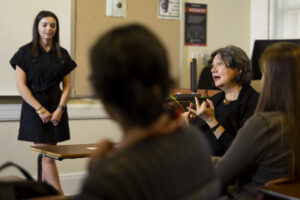
Through a mix of film and documentary screenings, lecture and discussion, readings and oral presentations–like this one by Kennedie Dyer–first-year students explore fashion’s highs and lows under the guidance of professor Katalin Medvedev. (Photo by Andrew Davis Tucker/UGA)
Katalin Medvedev
Professor of Textiles, Merchandising and Interiors
College of Family and Consumer Sciences
Fashion Industry: The High and Low
Katalin Medvedev’s seminar on the fashion industry is a crash course on culture and agriculture, environmentalism and economics, self-expression and responsibility.
“This class helped me realize that fashion is so much more than what you are wearing,” says Makaiya Chastain, a first-year student from Loganville who intends to major in fashion merchandising. “It says a lot about where you came from, who you are, and what you represent.”
As the seminar’s title spells out, there are highs and lows, and Chastain understands the balance. “Fashion isn’t something we need to get rid of,” Chastain says. “But there are ways to make the industry better. People just need to care about making a change.”
Lows, such as the environmental implications of fast fashion as well as other subjects like unfair labor practices and consumer consumption, are explored in-depth. But so are the highs, such as fashion’s cultural impact, economic impact—it’s a $2.5 trillion industry that employs a lot of people—and new efforts to make the fashion world more sustainable.
“The negative impact of fashion has been eye opening,” says Nick Yath, an intended finance major from Athens.
“I like to buy clothes, but I won’t do fast fashion,” he says, referring to fashion houses that make cheap clothes that last a short time. When they fade or shred, consumers buy more, perpetuating a cycle that ranks as one of the seminar’s biggest “lows.”
“What I like about First-Year Odyssey is that it’s not just fashion merchandising students,” Medvedev says. “When an English or business major comes in, they bring different topics. I really enjoy that.”

On this first day of his seminar, Geoffrey Smith hands his students packs of baseball cards. They discuss the classic stats on the back—home runs, RBIs, wins and losses. Over the course of the semester, the class dives much deeper into newer, more advanced statistics. (Photo by Chamberlain Smith/UGA)
Geoffrey Smith
Professor of Chemistry
Franklin College of Arts and Sciences
Baseball by the Numbers
Sometimes a First-Year Odyssey course is an opportunity for instructors to explore subjects that personally interest them while inviting students along for the ride.
Like his colleague Gregory Robinson, Geoffrey Smith is a professor in the Department of Chemistry. But as far as their courses are concerned, the similarities end there. Through his course, Baseball by the Numbers, Smith discusses one of his life’s passions in an educational setting.
“This way, I get to see business, sports science, psychology, biology majors—just a real cross-section of freshmen,” he says. “And they all like baseball. It’s a lot of fun.”
Smith divides meeting times into innings, and the three periods of individual presentations that end the course are the World Series. On day one, Smith hands out packs of baseball cards, and the class goes over the basic stats of home runs, RBIs, and wins and losses on the back. From there, they dive into content that would warm the heart of Brad Pitt’s hero in Moneyball.
While baseball’s advanced statistics may resemble chemical formulas (BABIP, wOBA, WAR, ERA+), Smith admits there isn’t a lot of crossover between this course and his typical subject matter. There is, however, detailed study of the math behind those stats and exploration of topics like machine learning, which is part of Smith’s chemistry curriculum.
Smith grew up in Atlanta and is a lifelong Braves fan. Since his family hailed from Massachusetts, he adopted the Boston Red Sox as his favorite American League team and Ted Williams as his favorite player. Smith never saw Williams play in person, of course, but the advanced statistics he goes over with his class allow him to compare modern players to classic counterparts.
“We have the stats to help us appreciate how good of a player he was,” Smith says. “It links you to the whole of baseball history.”
Fast Facts on First-Year Odyssey
- More than 400 seminars are available, representing each of UGA’s colleges and schools. Tenure-track faculty teach them all. Students can register for any of them regardless of intended major.
- Class size is capped at 18, but most seminars are smaller than that.
- Seminars meet for one hour a week, and students receive letter grades for their work and participation.
- As part of their seminar, all first-year students are required to attend three on-campus events. Options include musical performances, films, lectures, visiting speakers, and events like the Study Away Fair and Student Affairs’ Engagement Fair.
- Some of the university’s most senior leaders teach seminars, including Grady College Dean Charles Davis MA ’89, who taught “From TikTok to the Times: Journalism in a Changing World” last fall, and UGA President Jere W. Morehead JD ’80, whose “Exploring Current Issues in Law” seminar with Dean of Students Eric Atkinson MEd ’99, PhD ’10 has been a staple of the program since its inception.
- In fall 2023, UGA launched the First-Year Odyssey Global Citizenship Seminar Cluster of 10 global education courses, with sessions about scholarship support for experiences abroad and questions related to international study. The program has contributed to an increase in scholarship applications for study away coming from first-year students.


